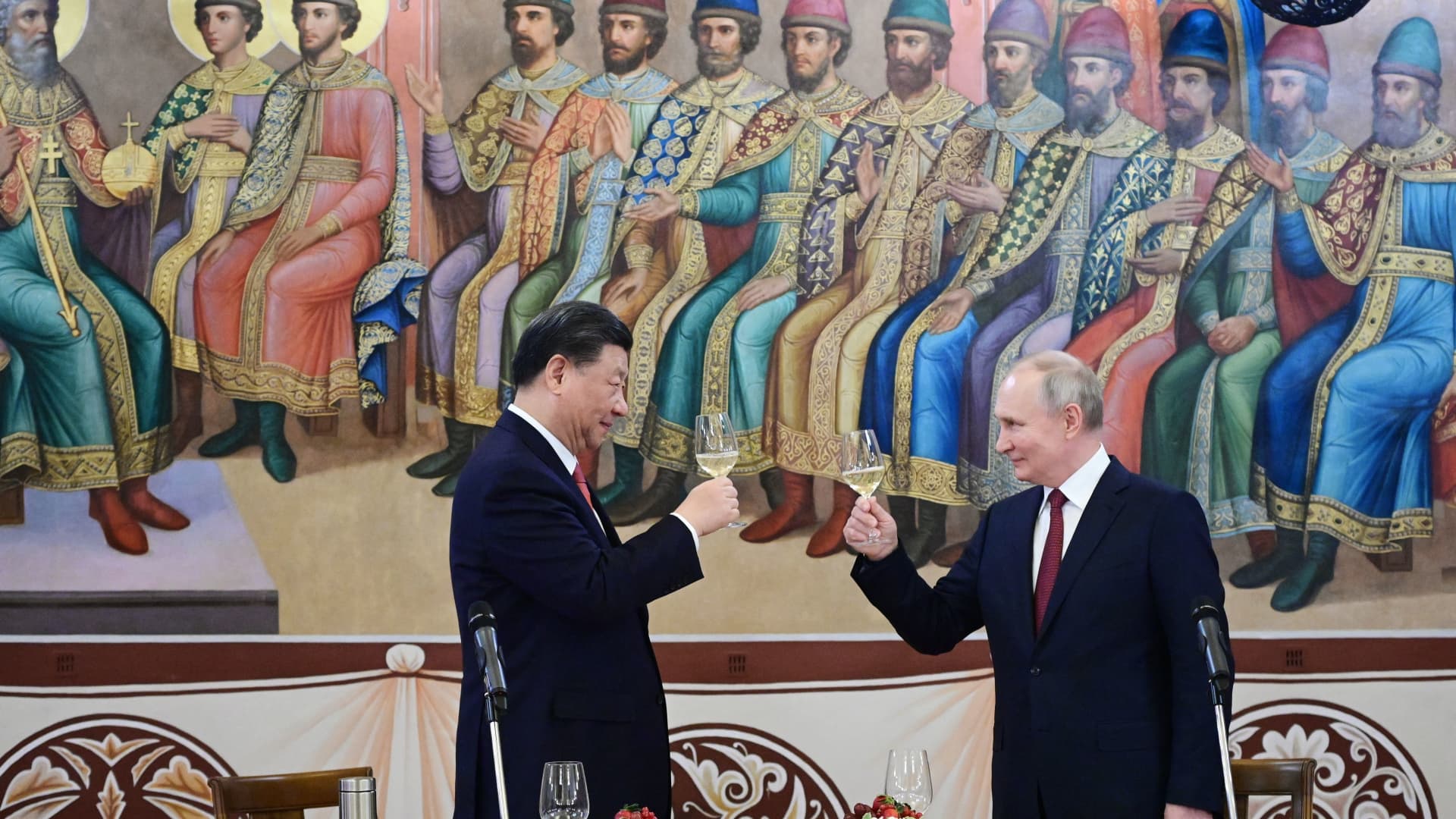China and Russia affirm economic cooperation for the next several years

Chinese President Xi Jinping and Russian President Vladimir Putin toast during a reception following their talks at the Kremlin in Moscow on March 21, 2023.
Pavel Byrkin | Afp | Getty Images
BEIJING — Chinese President Xi Jinping and Russian President Vladimir Putin have agreed to cooperate on a range of economic and business areas, both countries said Wednesday.
Prominent on the list was increasing the use of “local” currency, Chinese state media said. The Kremlin was more explicit in stating that the yuan and ruble already account for two-thirds of trade deal payments between the two countries.
Other areas the agreement covered included: expanding bilateral trade, cooperating in energy and food security and developing rail and other cross-border logistics infrastructure.
China is already Russia’s largest trading partner. Official statements from both sides disclosed few details on numbers or timeline of implementation, while noting the plan focused on the years leading up to 2030.
The affirmation of Russia-China economic cooperation comes as the U.S. and its allies have sanctioned Russia over its unprovoked invasion of Ukraine. Beijing has refused to call it an invasion, while calling for peace talks.
Xi went to Moscow this week in his first state visit since gaining an unprecedented third term as president earlier this month — further consolidating his power. “The Russian side held a grand welcome ceremony at the airport,” China’s readout said. “The military band played the national anthems of China and Russia.”
As has been the case, Russia’s readout of the economic agreement went into more detail than Beijing’s.
While the Chinese side only said they would “commit to significantly increase bilateral trade volume by 2030,” the Kremlin release described the planned trade growth as “multiple times over.”
China’s imports from Russia grew by nearly 49% last year in yuan terms to 763.75 billion yuan ($110.89 billion), according to China customs data accessed through Wind Information. That’s faster than the roughly 28% increase in 2021.
In another detail the Chinese side didn’t mention, the Russian statement said that, “When it comes to investment, our countries have compiled a package of 80 important and promising bilateral projects in various fields worth around $165 billion.”
“We support using Chinese yuan in transactions between the Russian Federation and its partners in Asia, Africa and Latin America,” the Kremlin release said.
The U.S. dollar remains by far the dominant currency for global transactions, although publicly available figures indicate use of the yuan has climbed into the low single-digit percentages.
Beijing has pushed for internationalization of its currency, as well as self-sufficiency in energy and food supply.
China and Russia are expanding a natural gas pipeline that supplies parts of China. While Beijing did not mention specifics, a statement from the Russian side this week said it increased gas supplies via the main “Power of Siberia” pipeline by 50% last year.
The two countries separately agreed to work together on media, official statements said. The Russian side said that included joint production of television programs and other cooperation between the two countries’ state-run media.
Uncertainty over Ukraine
Xi gave “considerable attention” to Chinese plans for Ukraine peace talks in a one-on-one conversation with Putin, the Kremlin said.
However, Putin said it was up to “the West and Kiev” to show “readiness” in order for a peaceful settlement to occur, according to the Russian side’s readout.
On Friday, the International Criminal Court issued an arrest warrant for Putin over alleged war crimes.
“The world should not be fooled by any tactical move by Russia, aided by China or any other country, to freeze the war on its terms without any viable pathway to restore Ukraine’s sovereignty and territorial integrity,” NSC Coordinator for Strategic Communications John Kirby said at a briefing earlier this week.
“If China wants to play a constructive role here in this conflict, then they ought to press Russia to pull its troops out of Ukraine and Ukrainian sovereign territory,” Kirby said in a subsequent briefing. “They should urge President Putin to cease bombing cities, hospitals, and schools; to stop the war crimes and the atrocities; and end the war today. It could happen right now.”
After his meeting with Putin in Moscow, Xi plans to speak with Ukrainian President Volodymyr Zelenskyy for the first time since the invasion, The Wall Street Journal reported last week, citing people familiar with the matter.
China’s Foreign Ministry has only said the country “stays in communication with all parties.”









